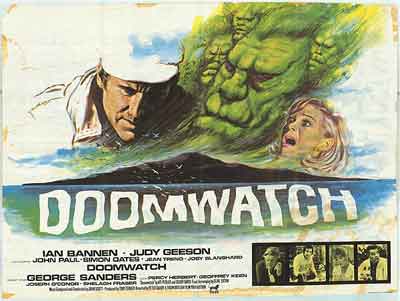Doomwatch 1972 is not really a horror film, says SELENE PAXTON-BROOKS

TITLE: Doomwatch
YEAR RELEASED: 1972
DIRECTOR: Peter Sasdy
Cast: Ian Bannen, Judy Geeson, John Paul, Simon Oates, Jean Trend, George Sanders
Review of Doomwatch 1972
The first interesting fact about the film version of Doomwatch 1972 is that it isn’t actually a horror film at all.
Following in the footsteps of many popular TV series of the time, like Steptoe & Son and On the Buses, the successful Doomwatch television programme was adapted for the big screen under licence from the BBC.
The original series, which ran between 1970 and 1972 (and revamped in by Channel 5 in 1999) could not be classed as horror either as it involved a scientific government agency led by Dr Spencer Quist (John Paul), which investigated ecological and technological dangers and fits more neatly into the science fiction genre due to its scientific storylines.
However, it was marketed as horror by Tigon British Film Productions who worked hard to imitate the success of ‘Hammer’ with films such as Witchfinder General (1968), The Curse of the Crimson Altar (1969), Blood on Satan’s Claw (1971) and The Beast in the Cellar (1971), and with Peter Sasdy at the helm it would probably have been ideal to play on horror’s popularity at the time.
It could also be argued that we can’t even classify it as sci-fi, due to the fact that the story plays on concerns for the environment and has its roots in the ‘Torvey Canyon’ super-tanker disaster of 18th March 1967, where 32,000,000 gallons of crude oil was spilt between the Isles of Scilly and Lands End, causing devastation to the wildlife and beaches in the area.
With all that said, if like me you love a good old 1970s thriller it is certainly an entertaining watch.
The film begins promisingly with a young girl being carried through a wood by a dark figure followed by a small entourage of weeping mourners, and a burial in the half light of the forest.
The credits roll with pictures of the oil disaster and we are swiftly introduced to the Doonwatch team in their lab, played by many of the original TV team.
We meet Dr. Del Shaw, played by Ian Bannen who never appeared in the original series but was brought in as it was thought that the TV cast were not big enough for the film version, being sent off to the island of Balfe by Dr Quist to collect samples for testing after an ecological disaster in the area.
We hear they are ‘a strange close lot’ and as Dr Shaw sets foot on the island he is shunned by islanders and we realise that all is not well.
My second interesting fact is that this film is shot in a way very reminiscent of ‘The Wicker Man’, released a year later in 1973, the eerie use of photography, showing villagers at windows and impending dark secrets kept from strangers, could have been inspiration for what I feel turned out a far superior film, and it made me wonder if ‘Doomwatch’ had influenced ‘The Wicker Man” in any way.
We go on to meet Victoria Brown, (Judy Geeson, again cast to up the ante as an up and coming face of the 70s) island school teacher, another foreigner staying at the guest house, who though initially hostile towards Dr Shaw becomes an ally at the end of the film.
The doctor gets on with his scientific collections with some beautifully filmed scenes on the beach, when he realises that he is being watched by a figure with a gun.
Actually he is being watched by most of the nervous villagers and when a fight ensues in the public house we start to notice that there is really something not quite right here.
This seems even more obvious when the doctor is attacked by dogs and finds the girl’s body in the wood, which subsequently disappears. After overhearing a conversation between the vicar and a villager Dr Shaw starts asking questions and ends up getting knocked out by a disfigured man in a barn.
Back at the lab the samples have been tested and results show that creatures found in the water are over-sized, fish are required for further tests.
To be honest it is here that Doomwatch 1972, which started off quite well, goes down hill.
Things become very scientific and slow, the writers seem want to portray a credible, scientifically grounded argument against dumping waste out at sea, probably echoing environmental concerns at the time and give us a story much more in line with the original TV series.
Dr Shaw’s conversations with the Royal Navy admiral played by George Sanders are dull to say the least, but we find out that a hormone is being leaked into the sea from illegal dumping in the area, contaminating the fish and causing islanders to get a condition called Acromegaly, which leads to excess growth of body tissues.
My third interesting fact as that the admiral tells us that they have ONLY dumped radioactive waste, which is perfectly fine! No one mentions that it is hazardous – maybe in 1972 they thought was thought safe?
Dr Shaw tries to explain to the village about the pituitary growth hormone in the fish by calling a meeting in the school rooms. We finally get to see the islanders with their disfigured faces, but even here there is nothing frightening and all we feel is sorry for these poor people who have suffered through no fault of their own.
The film poster originally read, ‘A remote island village… A team of intrepid scientists… A terrifying secret…’ I’m glad I didn’t see it all those years ago at the cinema, as I would no doubt have been disappointed!
But as a film of its time it’s still a must for any British film connoisseur. Filmed in beautiful Cornwall it is well worth a look, but don’t expect to be even a little bit terrified.
Tell us your thoughts on Doomwatch 1972 in the comments section!


